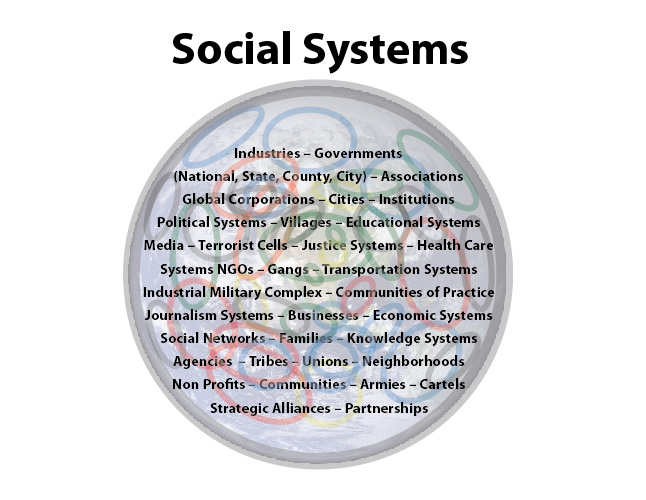Social Systems
 A social system is a purposeful web of social arrangements (relationships, agreements, accountability loops, etc) that shapes people's lives and interactions. Our social systems are all around us. They vary widely in size and complexity — from families, communities and neighborhoods to corporations, industries, governments and regions. We each belong to multiple social systems. We're born into, live within and die as members of our social systems. In a way, they are to us as water is to a fish — invisible and indescribable, yet absolutely essential. However, fish didn't invent water. Nor can they change their water. We, humans, invented our social systems. Mostly man invented them. We can reinvent them if we so choose. We can change our water. We assert that now is the time to so choose. Now is the time to make the big leap.
A social system is a purposeful web of social arrangements (relationships, agreements, accountability loops, etc) that shapes people's lives and interactions. Our social systems are all around us. They vary widely in size and complexity — from families, communities and neighborhoods to corporations, industries, governments and regions. We each belong to multiple social systems. We're born into, live within and die as members of our social systems. In a way, they are to us as water is to a fish — invisible and indescribable, yet absolutely essential. However, fish didn't invent water. Nor can they change their water. We, humans, invented our social systems. Mostly man invented them. We can reinvent them if we so choose. We can change our water. We assert that now is the time to so choose. Now is the time to make the big leap.
2012
USING EMERGENCE TO TAKE SOCIAL INNOVATIONS TO SCALE
by Margaret Wheatley and Deborah Frieze
In spite of current ads and slogans, the world doesn't change one person at a time. It changes as networks of relationships form among people who discover they share a common cause and vision of what's possible. This is good news for those of us intent on changing the world and creating a positive future. Rather than worry about critical mass, our work is to foster critical connections. We don't need to convince large numbers of people to change; instead, we need to connect with kindred spirits. Through these relationships, we will develop the new knowledge, practices, courage, and commitment that lead to broad-based change.
But networks aren't the whole story. As networks grow and transform into active, working communities of practice, we discover how Life truly changes, which is through emergence. When separate, local efforts connect with each other as networks, then strengthen as communities of practice, suddenly and surprisingly a new system emerges at a greater level of scale.
by Margaret Wheatley and Deborah Frieze ©2006
Nine Low-Tech Steps For Community Resilience In A Warming Climate
Over the past 50 years, our average global temperature has increased at the fastest rate in recorded history. That is fact, not opinion. Scientists say that under current trends, average US temperatures could be 3 to 9 degrees higher by the end of the century.
This is not abstract, nor are the effects limited to the developing world. These changes will have — indeed, are already having — major effects on our cities, suburbs, and towns. Chicago is becoming warmer. So is Orlando. So are Spokane and Dallas. So are smaller towns such as Louisville, Colorado and suburbs such as Gaithersburg, Maryland. Everyone has weather, and everyone's weather is getting warmer. By fits and starts, to be sure; but, if you don't believe it, ask a landscaper. The serious impacts beginning and yet to come are not pretty and, as my colleague Kim Knowlton has reported, even the insurance industry is noticing.
Meanwhile, there are also measures we need to take right now inside our communities so that we are as prepared as possible for the warmer climate ahead.
Apr 3, 2012
How are we growing?
The human population of the earth has more than doubled in my lifetime. The population of many non-human species has fallen catastrophically over the same period. The extinction rate for existing species is very high, and that is caused by the expansion of human settlements and resource use. Here are the numbers:
World Population 1804 1 Billion
World Population 1927 2 Billion (Last Billion took 123 years)
World Population 1960 3 Billion (Last Billion took 33 years)
World Population 1974 4 Billion (Last Billion took 14 years)
World Population 1987 5 Billion (Last Billion took 13 years)
World Population 1999 6 Billion (Last Billion took 12 years)
World Population 2012 7 Billion (Last Billion took 13 years)
Estimated World Population 2025 8 Billion (Last Billion 13 years?)
Estimated World Population 2040 9 Billion (Last Billion 14 years?)
Community Organizers Handbook:
![]() Launching a resource for NetSquared Local and beyond!
Launching a resource for NetSquared Local and beyond!
Over the last few years, the NetSquared Local network has grown from just a few groups in only a couple countries, to 70+ groups in 21+ countries! Those Local groups are organized by volunteers passionate about building community at the intersection of technology and social change. We support organizers with resources, assistance, and other connections, but we believe the most valuable resource comes from organizers having access to each other and sharing between themselves. We also recognize that we aren't the only ones working in this space and the more knowledge we can share, with more changemakers and organizers, the more we can all be even better. So, it's with great excitement that we announce the ![]() Community Organizers Handbook!
Community Organizers Handbook!
